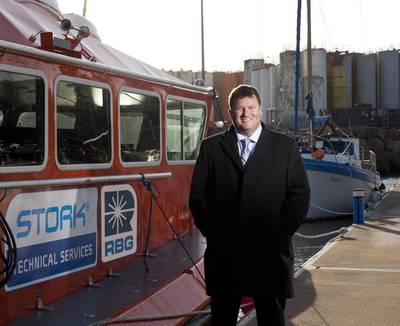RBG Boosts Capabilities with Dive Intervention Craft
RBG, the leading provider of assess, inspect and repair (AIR) services to the global energy industry that was recently acquired by Stork Technical Services (STS), has enhanced its subsea service capability with the launch of two purpose-built dive intervention craft (IC).
The launch was announced by RBG’s new Marine & Subsea director, Roddy James, who joined the company in October 2011 from STS having previously served as global account director, oil & gas. In his new role, Mr James is responsible for leading and growing RBG’s global marine & subsea activities, and identifying subsea project and contract opportunities that can utilise the skills, expertise and technology from across RBG & STS marine & subsea portfolios.
RBG invested around £2million in the ICs which will support the delivery of specialist marine and subsea services, including subsea intervention, air and nitrox diving, survey and light ROV work, throughout RBG’s global operations. In the coming weeks, the ICs are being deployed for a number of integrated subsea IRM (inspection repair and maintenance) activities, both inshore and offshore. The ICs are equipped with a range of advanced technology, such as a bespoke diver recovery system and software based dive management systems, that have been specifically designed to provide a safe operating environment for the divers and crew onboard.
The ICs offer a stand-alone shallow water diving solution up to depths of 50 metres and can operate at ranges up to 150 nautical miles offshore. The craft can also be launched by a bespoke davit system, from the RBG chartered Olympic Triton vessel, to allow continuous onsite diving which provides significant efficiency and logistical benefits to customers. The ICs provide a flexible alternative to dive support vessels for maintenance and survey activity, which often have restricted access to areas around rigs and FPSOs.
Mr James, who has 12 years experience in the oil and gas industry and started his offshore career as a diver, said: “The intervention craft are an important addition to our marine and subsea fleet. We are experiencing a significant demand for our subsea services and the ICs will ensure we can continue to deliver our integrated offering safely wherever we operate.” “We have delivered safe, innovative and cost-effective subsea solutions for our customers for more than ten years and I am confident this investment will help us grow this excellent track record. As RBG integrates with and rebrands as Stork Technical Services, our customers will benefit from a wider subsea service offering and access to new technologies from across STS.”














